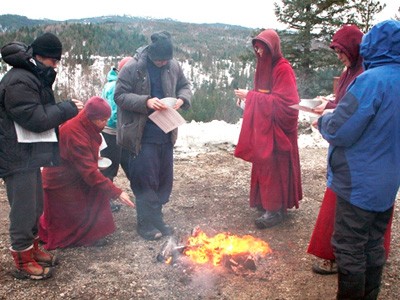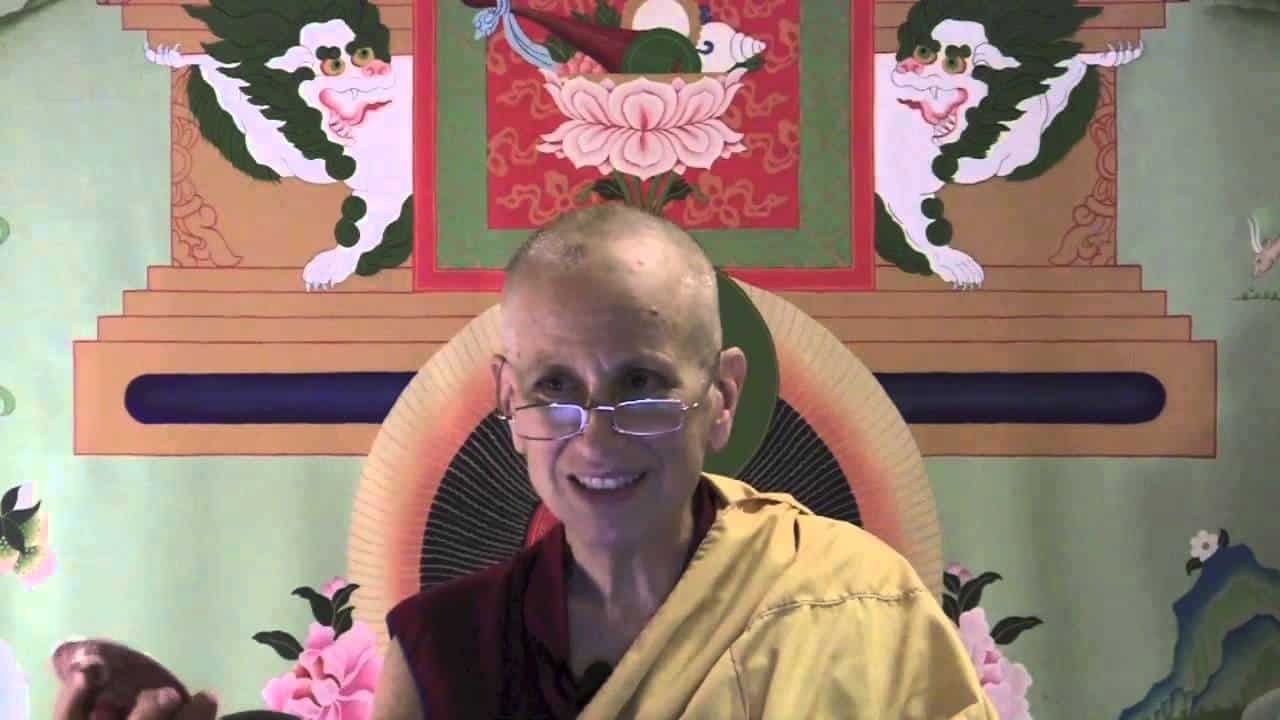Verse 68: The one with intense discipline
Part of a series of talks on Gems of Wisdom, a poem by the Seventh Dalai Lama.
- How to recognize and work with what is going on in our minds
- Counteracting the force of habit, learning to put the brakes on our habitual reactions
- What mindfulness and attentiveness mean in a Buddhist context
Gems of Wisdom: Verse 68 (download)
Who has such intense discipline that nothing can throw him from the way?
One in control of his or her own energies, who does not become stained with faults.
You have such intense discipline that nothing can throw you from the way. In other words, to have intense discipline you need to be in control of your energy, don’t you? You need the introspective awareness that we were talking about before—the attentiveness that we talked about before—so that you can recognize what’s going on in your mind.
But sometimes recognizing it isn’t sufficient, is it? If we recognize: “Yes, I am craving chocolate ice cream,” as we go to the freezer and scoop it out into a bowl. “Yes, I’m very mindful. My introspective awareness is functioning very well. I am craving chocolate ice cream.” [or] “I am very aware, I am furious at this person and I really want to criticize him.” Open mouth, tell him off.
Just the recognition of what’s going on inside of us is not sufficient. We also have to have a wisdom mind that can discriminate virtue from non-virtue—in other words, what is wholesome from what is not wholesome—so that we can decide what direction we want to go in. And then we need the self-discipline and the inner control of our energy to guide our body, speech, and mind towards the direction that we want to go in.
Because I don’t know about you, but many times I recognize there’s a negative attitude—a negative emotion—in my mind, and I identify it, and say, “Gee, now is the time to be quiet,” and then I open my mouth. Do any of you have that problem, too?
We often feel like this mind has a mind of its own. That it’s just operating independent of what we would like it to do. That happens because of habit. Our habitual energy, habits, which are quite linked with karma, aren’t they? Because one of the karmic results is the tendency to do the action again. Whether it’s a virtuous or non-virtuous action, we set up some kind of tendency, some kind of habitual thing. Our energy going in that way. And then, in the case of the negative tendencies (the harmful ones) it really takes some discipline to say, “Okay, I’m feeling this urge to do something but I’m really not going to do it.” And then to watch how the mind thinks up ways to rationalize doing it anyway. Like, “I know if I say this, I know that….”
Let’s say I’m jealous of somebody, and so I want to say this thing to hurt their feelings because I’m jealous of them. So I notice that, I don’t want to say that, I don’t want to say anything motivated by jealousy. But on the other hand, if I don’t say anything then this person won’t realize what they’re doing, and how their own actions are so conceited, and how they’re so uppity. So I really need to say something so that this person will get some kind of feedback that may help them. Right? So now, for the benefit of the other person, I’m going to give them feedback about how they’re appearing to other people, because they may not be aware of it. Right?
Of course, with such benevolence. Because somebody really needs to say something to this person. Because otherwise, if nobody says anything, then they’re just going to keep on acting like this. And then they will not only be conceited and arrogant and proud, but they will start running the whole group. So somebody has to put their foot down. For the benefit of everybody in the group, so that this person doesn’t just…. [laughter] So we have no inner discipline, do we?
I just talked everybody in to going ahead and saying it. [laughter]
“One who is in control of his or her own energies who does not become stained with faults.” So, (one) who can really stop…. You know, the locomotive’s going in one direction, and to really put the brakes on and say, “Yes, I know that I want to do that, but I’m going to really pull back this time.”
It’s interesting because the first time you pull back it’s really difficult. But then as you create a new habit, then it becomes easier, doesn’t it? They say anything becomes easier with habit.
It’s the same thing, we look at the pile of chocolate chip cookies over there and say, “Yes, there’s craving in my mind. But no, I’m not going to eat them because they’re not good for my health, and I’m already overweight, and it’s snowing so I’m not getting enough exercise… But… Today, actually, I walked a little bit more than usual, so I have those extra calories to burn. And somebody made those cookies, they’ll be so upset if nobody eats them…” And on and on, you know?
So the plate will be empty by the end of lunch.
I’m not saying we should all exercise restraint.
Or at least I shouldn’t. [laughter]
This is the way our mind works.
Audience: I’ll put them back in the fridge.
Venerable Thubten Chodron (VTC): You’ll put them back in the fridge. And then you’ll eat them when nobody else is around. [laughter]
Any other comments?
[In response to audience] So the phrase is “oh, for god’s sake.” Doesn’t that make you stop and wonder “who’s god?”
Audience: It’s the cue that, “Here we go.”
VTC: Okay, so that’s the cue. God doesn’t exist so for god’s sake then I can really do anything. [laughter]
But that’s interesting you have a cue where you know that you’re beginning the rationalization process.
[In response to audience] You mean when you’re having kind of the internal civil war of “should I eat it, shouldn’t I eat it?” I mean, that’s just regarding food. It could be “should I say it, shouldn’t I say it, should I do this, should I not?” And then when you just say, “let it go,” then you find that your whole body even relaxes, because not only your mind but also your body was tight. Yes. We can feel that very much.
Venerable Thubten Chodron
Venerable Chodron emphasizes the practical application of Buddha’s teachings in our daily lives and is especially skilled at explaining them in ways easily understood and practiced by Westerners. She is well known for her warm, humorous, and lucid teachings. She was ordained as a Buddhist nun in 1977 by Kyabje Ling Rinpoche in Dharamsala, India, and in 1986 she received bhikshuni (full) ordination in Taiwan. Read her full bio.


